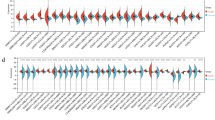Abstract
The connection between microRNA expression and cancers has been identified, and microRNAs may be considered as important prognostic biomarkers. However, it is still inconsistent whether expression of let-7 can predict prognosis in patients with multiple cancers. A meta-analysis was performed by searching PubMed, EMBASE, and ISI Web of Science databases. All data were extracted from articles comparing prognosis in patients with multiple cancers having low expression of let-7 with those having high expression. Pooled hazard ratios (HRs) and corresponding 95 % confidence intervals (CIs) were calculated. Subgroup analyses were conducted for cancer type and ethnicity. A total of 1,757 cases of multiple cancers were involved for this meta-analysis. The HR of low let-7 expression in multiple cancers was 1.80 (95 % CI 1.18–2.76), and that in lung cancer was 1.99 (95 % CI 1.17–3.40). A subgroup analysis was performed on ethnicity; combined HR was 1.61 (95 % CI 0.84–3.11) for Asians and 1.94 (95 % CI 1.11–3.39) for non-Asians. Low expression of let-7 might predict poor prognosis in patients with multiple cancers, especially in lung cancer. Furthermore, let-7 might be a biomarker in non-Asian patients with favorable prognosis.




Similar content being viewed by others
References
Yang W, Lee DY, Ben-David Y. The roles of microRNAs in tumorigenesis and angiogenesis. Int J Physiol Pathophysiol Pharmacol. 2011;3:140–55.
Hong L, Han Y, Zhang H, Li M, Gong T, Sun L, et al. The prognostic and chemotherapeutic value of miR-296 in esophageal squamous cell carcinoma. Ann Surg. 2010;251:1056–63.
Liu R, Liao J, Yang M, Sheng J, Yang H, Wang Y, et al. The cluster of miR-143 and miR-145 affects the risk for esophageal squamous cell carcinoma through co-regulating fascin homolog 1. PloS one. 2012;7:e33987.
Lu J, Getz G, Miska EA, Alvarez-Saavedra E, Lamb J, Peck D, et al. MicroRNA expression profiles classify human cancers. Nature. 2005;435:834–8.
Sugimura K, Miyata H, Tanaka K, Hamano R, Takahashi T, Kurokawa Y, et al. Let-7 expression is a significant determinant of response to chemotherapy through the regulation of IL-6/STAT3 pathway in esophageal squamous cell carcinoma. Clin Cancer Res. 2012;18:5144–53.
Lee JY, Kim HJ, Yoon NA, Lee WH, Min YJ, Ko BK, et al. Tumor suppressor p53 plays a key role in induction of both tristetraprolin and let-7 in human cancer cells. Nucleic Acids Res. 2013;41:5614–25.
Kong D, Heath E, Chen W, Cher ML, Powell I, Heilbrun L, et al. Loss of let-7 up-regulates EZH2 in prostate cancer consistent with the acquisition of cancer stem cell signatures that are attenuated by BR-DIM. PloS one. 2012;7:e33729.
Chan HW, Lappas M, Yee SW, Vaswani K, Mitchell MD, Rice GE. The expression of the let-7 miRNAs and Lin28 signalling pathway in human term gestational tissues. Placenta. 2013;34:443–8.
Jiang Y, Qin Z, Hu Z, Guan X, Wang Y, He Y, et al. Genetic variation in a hsa-let-7 binding site in RAD52 is associated with breast cancer susceptibility. Carcinogenesis. 2013;34:689–93.
He XY, Chen JX, Zhang Z, Li CL, Peng QL, Peng HM. The let-7a microRNA protects from growth of lung carcinoma by suppression of k-Ras and c-Myc in nude mice. J Cancer Res Clin Oncol. 2010;136:1023–8.
Pan L, Gong Z, Zhong Z, Dong Z, Liu Q, Le Y, et al. Lin-28 reactivation is required for let-7 repression and proliferation in human small cell lung cancer cells. Mol Cell Biochem. 2011;355:257–63.
Fu X, Han Y, Wu Y, Zhu X, Lu X, Mao F, et al. Prognostic role of microRNA-21 in various carcinomas: a systematic review and meta-analysis. Eur J Clin Invest. 2011;41:1245–53.
Xu W, Xu J, Liu S, Chen B, Wang X, Li Y, et al. Effects of common polymorphisms rs11614913 in miR-196a2 and rs2910164 in miR-146a on cancer susceptibility: a meta-analysis. PloS one. 2011;6:e20471.
Nair VS, Maeda LS, Ioannidis JP. Clinical outcome prediction by microRNAs in human cancer: a systematic review. J Natl Cancer Inst. 2012;104:528–40.
Yang M, Shen H, Qiu C, Ni Y, Wang L, Dong W, et al. High expression of miR-21 and miR-155 predicts recurrence and unfavourable survival in non-small cell lung cancer. Eur J Cancer. 2013;49:604–15.
Cui EH, Li HJ, Hua F, Wang B, Mao W, Feng XR, et al. Serum microRNA 125b as a diagnostic or prognostic biomarker for advanced NSCLC patients receiving cisplatin-based chemotherapy. Acta Pharmacol Sin. 2013;34:309–13.
Hayes DF, Isaacs C, Stearns V. Prognostic factors in breast cancer: current and new predictors of metastasis. J Mammary Gland Biol Neoplasia. 2001;6:375–92.
Voortman J, Goto A, Mendiboure J, Sohn JJ, Schetter AJ, Saito M, et al. Microrna expression and clinical outcomes in patients treated with adjuvant chemotherapy after complete resection of non-small cell lung carcinoma. Cancer research. 2010;70:8288–8298.
Author information
Authors and Affiliations
Corresponding author
Additional information
Yang Xia, Yi Zhu, and Xiaoying Zhou contributed equally to this work.
Rights and permissions
About this article
Cite this article
Xia, Y., Zhu, Y., Zhou, X. et al. Low expression of let-7 predicts poor prognosis in patients with multiple cancers: a meta-analysis. Tumor Biol. 35, 5143–5148 (2014). https://doi.org/10.1007/s13277-014-1663-0
Received:
Accepted:
Published:
Issue Date:
DOI: https://doi.org/10.1007/s13277-014-1663-0




